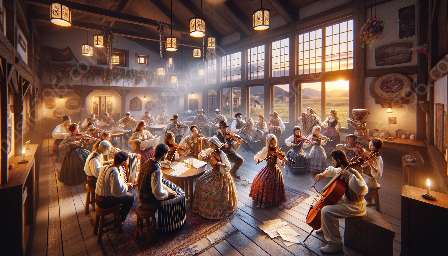The captivating melodies and rhythms of bossa nova have captivated audiences worldwide, making it a significant area of academic study. This topic cluster delves into the academic exploration of bossa nova, its cultural impact, and its relationship with world music.
History of Bossa Nova
Bossa nova originated in Brazil in the late 1950s and gained international recognition for its unique blend of samba rhythms and jazz influences. Its roots can be traced back to the vibrant music scene of Rio de Janeiro, where artists like João Gilberto and Antônio Carlos Jobim pioneered this genre.
Musical Characteristics of Bossa Nova
Bossa nova is characterized by its distinctive syncopated rhythms, gentle guitar playing, and intimate vocals. The genre often features complex harmonies and sophisticated melodies, creating a soothing and elegant musical experience.
Cultural Impact of Bossa Nova
Bossa nova has had a profound impact on global music and culture, influencing artists across various genres and regions. Its sensual and laid-back aesthetic has left an indelible mark on world music, inspiring countless musicians and captivating audiences with its enchanting melodies.
Theoretical and Analytical Studies
Academic research on bossa nova encompasses theoretical and analytical studies that explore its musical structures, historical evolution, and sociocultural significance. Scholars delve into the complex harmonies, rhythmic intricacies, and lyrical themes of bossa nova to gain a deeper understanding of its artistic and cultural relevance.
Bossa Nova in a Global Context
Examining bossa nova within the framework of world music allows for a comprehensive understanding of its global reach and cross-cultural influences. Academic studies often analyze how the genre has interacted with and influenced other musical traditions, fostering a rich tapestry of musical exchange and creativity.
Interdisciplinary Perspectives
The academic study of bossa nova embraces interdisciplinary perspectives, drawing from fields such as ethnomusicology, cultural studies, and music theory. Scholars explore the multifaceted nature of bossa nova, considering its historical, social, and aesthetic dimensions to enrich their scholarly inquiries.
Academic Institutions and Research Centers
Universities and research centers around the world have established dedicated programs and initiatives focused on the academic study of bossa nova. These institutions serve as hubs for scholarly discourse, facilitating collaborations and fostering a community of researchers passionate about exploring the richness of bossa nova.
Future Directions in Bossa Nova Research
As the academic study of bossa nova continues to evolve, future research directions may encompass exploring the genre's contemporary adaptations, its impact on popular culture, and its ongoing resonance in the global music landscape. Scholars are poised to uncover new facets of bossa nova, ensuring its enduring relevance in academic discourse and cultural appreciation.










































